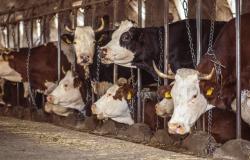The decline in births and the lengthening of life, a phenomenon which is affecting all countries of the world to varying degrees, will have disruptive effects on the structure of the world population in the years to come. According to forecasts from the most authoritative sources, from the United Nations to the Institute for Health Metrics and Evaluation (Ihme) of the University of Washington, the Earth should reach a peak of 9.7 billion inhabitants between 2050 and 2065, and then fall to around 8.8 billion in 2100, a year in which, according to a recent study published in the “Lancet”, 97% of countries will now have fertility rates lower than 2.1 children per woman, a quota considered necessary to maintain stable the population.
In short, the average age of human beings on Earth is destined to increase drastically in the coming years, there will be fewer and fewer young people, and the global population will at a certain point begin to decline due to demographic causes. We are now fully aware of this, particularly in Italy, a nation that is anticipating this transformation more than others, and which has already begun to deal with the most critical consequences, such as the sustainability of the healthcare and social security systems, or the competitiveness of the economy in the absence of productivity increases.
However, if the decline in the birth rate has so far produced much debate (and few solutions) due to the effects linked to the decline in the active population, little is said about how family structures and kinship ties will change. Yet the revolution, in this area, will be no less significant: brothers or cousins, for example, in the future will be increasingly rarer relatives, while family groups will tend to shrink, losing their horizontality, but also to lengthen, becoming more vertical and coming to bring together more and more generations, with very strong age differences.
A study published in the authoritative scientific journal “Pnas” (Projections of human kinship for all countries), conducted by Diego Alburez-Gutierrez, of the Max Planck Institute for Demographic Research in Rostock, Ivan Williams of the University of Buenos Aires and Hal Caswell of the University of Amsterdam, from which very interesting ideas emerge linked in particular to the dimension of care Thinner family networks mean that people will have fewer relatives to draw support from at key stages in their lives, the researchers write.
An example can give a good idea of the transformation underway: in 1950 a 65-year-old woman had a family network made up of 41 people; in 2095, however, a 65-year-old woman will only be able to count on 25 relatives. It is a global average, but still emblematic: it is a 40% drop in relatives. There is also a qualitative aspect to the change: if fewer and fewer children are born, and many of these remain only children, and the age of first birth rises, and life becomes longer, it is clear that a child who comes into the world today at a certain point in his life he may find himself having elderly parents, even older grandparents, very old great-grandparents, and no siblings or cousins with whom to share this family condition.
In Europe and the United States, for example, the number of relatives of a 65-year-old person will drop from 25 in 1950 to 15.9 in 2095 (-37%); in Italy the reduction will not be particularly painful, because the problem is already among us, and relatives are destined to drop from 18 to 12.7 (-30%)
There are many food for thought. Who will take care of whom? If you become a parent at an older age it is more difficult to count on the support of your grandparents. But at the same time, becoming a grandparent when you are too old can reduce the possibility of being cheered by the life-giving joy of your grandchildren. And finding yourself as a single adult, without brothers, sisters or cousins, with multiple generations of elderly people to think about, can be decidedly problematic. It is true for anyone, and it will be even more so in countries with fewer resources or with budget problems, or where the role of relatives is decisive in carrying out care tasks.
In Europe and the United States, for example, the number of relatives of a 65-year-old person will drop from 25 in 1950 to 15.9 in 2095 (-37%); in Italy the reduction will not be particularly painful, because the problem is already among us, and relatives are destined to fall from 18 to 12.7 (-30%). It is in Latin America and the Caribbean that the reduction in kinship will reach dramatic levels, going from 56 relatives to 18.3 (-67%). It will be even worse in nations like Zimbabwe, where the family network in 1950 numbered 82 people and by the end of the century it will be reduced to 24: a drop of 71%.
As you can imagine, the revolution will be economic, but also social and cultural. What will a world be like without siblings or cousins and only direct relatives, but with very high ages and very large differences? Will friends be enough to reproduce a dynamic similar to that which has always been represented by relatives and one’s own family? To convey the meaning of what the aging of parental networks can entail, the research takes the case of China, another emblematic country because it is in the midst of a demographic decline with epochal characteristics. A Chinese child who came into the world in 1950 grew up surrounded by 11 cousins, who together represented almost 40% of his family network; in 2095, however, an average newborn in Beijing will have to deal with only one cousin, who will represent 7% of his total parental ties. The others will all be adults or very elderly people: for a Chinese newborn in 1950 there were on average 2.8 living grandparents and 1.7 great-grandparents, in 2095 the great-grandparents of each baby will be 5.3: 300% more .
Let’s take the case of Italy again: if in 1950 a 35-year-old woman had a grandmother who was around 78 years old, towards the end of the century the grandmother of a thirty-five-year-old will be 87 years old, almost ten more
Increasing life expectancies, but also the later age at which people become parents, will result not only in multigenerational family networks, but also in bonds that will last much longer. Let’s take the case of Italy again: if in 1950 a 35-year-old woman had a grandmother who was around 78 years old, towards the end of the century the grandmother of a thirty-five-year-old will be 87 years old, almost ten more. Fewer children, fewer brothers and sisters, fewer cousins, many older generations who however may not have grandchildren from either their brothers or their children: seen from Italy, the transformation has already been underway for some time, and over the years it could accentuate its characteristics . Today in our country there are 3.8 million non-self-sufficient elderly people, out of almost 60 million inhabitants: it is clear that the resources for a real care reform will have to be found sooner or later, regardless of the ability to restart at least one some births.
And what will happen to those countries where welfare systems are less advanced and family networks still represent the first if not the only form of support? And what cultural transformation will all this entail, thinking about the meaning we still attribute to the term “care”, in the face of an expansion of the needs and challenges posed by supporting non-self-sufficient people, who are expected to be more numerous?
There is an example, contained in the study, emblematic and at the same time rather disturbing, and it imagines a funeral ceremony after the year 2100 of a person who came into the world in the present day: without the experience of brothers, sisters, cousins of first or second degree, it is possible that in the future people will no longer dare to ask defendants who they do not recognize the fateful question: “Excuse me, are you a relative?”. Because, most likely, there will be no more relatives. But who knows, perhaps the demographic revolution will give a new direction to the value of friendship.







